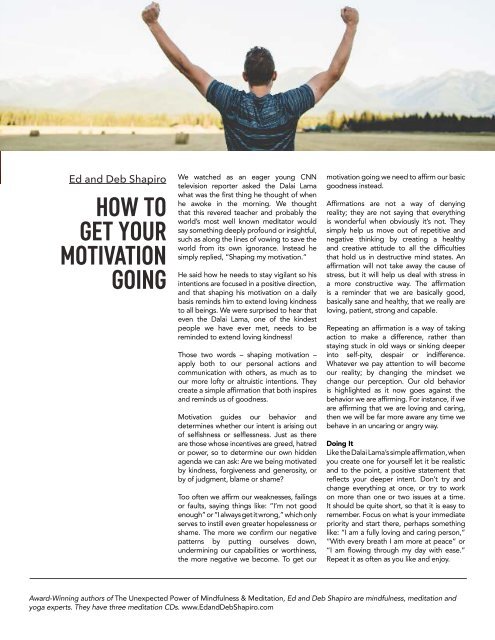24 Seven November 2017
Change Your Attitude… Change Your Life: 24/seven is a monthly, free magazine for personal growth, professional development, and self-empowerment. The approach is holistic, incorporating mind, body, soul, and spirit. As philosopher Francis Bacon said, “Knowledge is power.” Use this information to live your best life now.
Change Your Attitude… Change Your Life: 24/seven is a monthly, free magazine for personal growth, professional development, and self-empowerment. The approach is holistic, incorporating mind, body, soul, and spirit. As philosopher Francis Bacon said, “Knowledge is power.” Use this information to live your best life now.
You also want an ePaper? Increase the reach of your titles
YUMPU automatically turns print PDFs into web optimized ePapers that Google loves.
Ed and Deb Shapiro<br />
HOW TO<br />
GET YOUR<br />
MOTIVATION<br />
GOING<br />
We watched as an eager young CNN<br />
television reporter asked the Dalai Lama<br />
what was the first thing he thought of when<br />
he awoke in the morning. We thought<br />
that this revered teacher and probably the<br />
world’s most well known meditator would<br />
say something deeply profound or insightful,<br />
such as along the lines of vowing to save the<br />
world from its own ignorance. Instead he<br />
simply replied, “Shaping my motivation.”<br />
He said how he needs to stay vigilant so his<br />
intentions are focused in a positive direction,<br />
and that shaping his motivation on a daily<br />
basis reminds him to extend loving kindness<br />
to all beings. We were surprised to hear that<br />
even the Dalai Lama, one of the kindest<br />
people we have ever met, needs to be<br />
reminded to extend loving kindness!<br />
Those two words – shaping motivation –<br />
apply both to our personal actions and<br />
communication with others, as much as to<br />
our more lofty or altruistic intentions. They<br />
create a simple affirmation that both inspires<br />
and reminds us of goodness.<br />
Motivation guides our behavior and<br />
determines whether our intent is arising out<br />
of selfishness or selflessness. Just as there<br />
are those whose incentives are greed, hatred<br />
or power, so to determine our own hidden<br />
agenda we can ask: Are we being motivated<br />
by kindness, forgiveness and generosity, or<br />
by of judgment, blame or shame?<br />
Too often we affirm our weaknesses, failings<br />
or faults, saying things like: “I’m not good<br />
enough” or “I always get it wrong,” which only<br />
serves to instill even greater hopelessness or<br />
shame. The more we confirm our negative<br />
patterns by putting ourselves down,<br />
undermining our capabilities or worthiness,<br />
the more negative we become. To get our<br />
motivation going we need to affirm our basic<br />
goodness instead.<br />
Affirmations are not a way of denying<br />
reality; they are not saying that everything<br />
is wonderful when obviously it’s not. They<br />
simply help us move out of repetitive and<br />
negative thinking by creating a healthy<br />
and creative attitude to all the difficulties<br />
that hold us in destructive mind states. An<br />
affirmation will not take away the cause of<br />
stress, but it will help us deal with stress in<br />
a more constructive way. The affirmation<br />
is a reminder that we are basically good,<br />
basically sane and healthy, that we really are<br />
loving, patient, strong and capable.<br />
Repeating an affirmation is a way of taking<br />
action to make a difference, rather than<br />
staying stuck in old ways or sinking deeper<br />
into self-pity, despair or indifference.<br />
Whatever we pay attention to will become<br />
our reality; by changing the mindset we<br />
change our perception. Our old behavior<br />
is highlighted as it now goes against the<br />
behavior we are affirming. For instance, if we<br />
are affirming that we are loving and caring,<br />
then we will be far more aware any time we<br />
behave in an uncaring or angry way.<br />
Doing It<br />
Like the Dalai Lama’s simple affirmation, when<br />
you create one for yourself let it be realistic<br />
and to the point, a positive statement that<br />
reflects your deeper intent. Don’t try and<br />
change everything at once, or try to work<br />
on more than one or two issues at a time.<br />
It should be quite short, so that it is easy to<br />
remember. Focus on what is your immediate<br />
priority and start there, perhaps something<br />
like: “I am a fully loving and caring person,”<br />
“With every breath I am more at peace” or<br />
“I am flowing through my day with ease.”<br />
Repeat it as often as you like and enjoy.<br />
Award-Winning authors of The Unexpected Power of Mindfulness & Meditation, Ed and Deb Shapiro are mindfulness, meditation and<br />
yoga experts. They have three meditation CDs. www.EdandDebShapiro.com


















